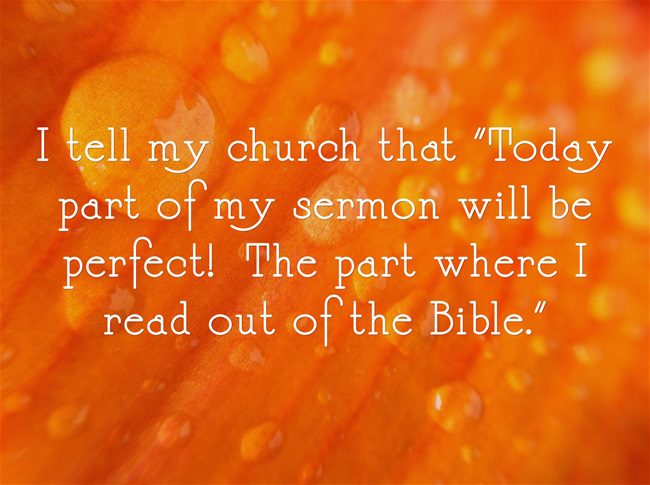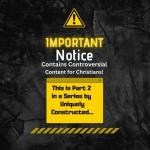If you were preparing a sermon, what steps would you take? Here are 7 important steps that could help you prepare in giving a sermon.
The Essential of Prayer
There is nothing more important in life than prayer and so how much more important is prayer in sermon preparation? Our ultimate Teacher is the Holy Spirit and so ask God the Holy Spirit to enlighten you, to guide you, and give you insight into what the message should be about. I have read some Bible chapters and verses and then, all of a sudden, something just jumps out at me that I have never seen before. Even though I might have read it many times, it’s like a flashlight was turned on in a certain verse or word and the meaning of the verse just jumped right off of the page. I believe before a person studies the Bible, whether a preacher or not, they should ask God to have the Holy Spirit give them help in understanding what is written so that we can pass this on to those who will hear a message on this or these verses that God wants them to hear.
Use Different Translations and a Study Bible
If you are going to give a sermon on persecution, look at a passage in different translations. I have an ESV, the New King James Version, the NASB, the King James Version and a few others and it’s sometimes helpful to see how these passages are written in different translations. Even the Living Bible, which is a paraphrase, can make it sound like someone’s writing this especially to you although I have heard that paraphrased Bibles are not good to be used in sermons. You might use a study Bible to see what the commentary says about certain verses. Although the study notes are not inspired by God they might inspire you to think of something to add about the verses you are preaching on. I have a King James Bible that has margins in the middle that have scriptural references to other Bible passages which can help clarify or give more meaning to the verse or verses you are studying. Also, in my Bible there are numbered notations that give the original Greek, Hebrew or Aramaic of a certain word and that can make the passage more clear. I also love the website blueletterbible.org because it helps me find additional meanings of Greek, Hebrew or Aramaic words which may clarify a word that otherwise may be simply read over.
Create an Outline
One seminary professor of mine believes in having the entire sermon printed out. I tried that once and it felt like I was giving a speech. It felt too mechanical to me. My primary notes are really reading straight out of the Bible. I highlight certain sections of my Bible and then I draw a line to the blank sections of each page and put in the original Greek, Hebrew or Aramaic word or to make a point about what that passage is saying. Make the outline with simple headings; give a brief word or two about what this section is about. Follow that section with the Scriptures that you are going to use. I prefer reading the Scriptures out of the Bible because there is less margin of error if you read it out of the Bible than having Scriptures printed out on your outlines because they may contain typos or leave or insert additional words. I tell my church that “Today part of my sermon will be perfect! The part where I read out of the Bible.”
Pick One Bible and Stick to it
I use the King James Version because it gives the words that have been added in italics. Many Bibles don’t give you the italics but mine does and here’s why I use it. When I read my King James Bible it has some words in italics and the words in italics are words that were inserted by the translators to make it more readable. For example, the Hebrew language have no vowels in their words…they contain only consonants so they had to insert vowels when translating it to make it easier to read. If you have a Bible with italics, I would use it because then you can see which words were not in the original manuscripts. Sometimes when I read my Bible verses in the sermon, I leave out the italic words and this makes the original author’s purpose stand out in stark contrast to what it might say with the added words that were italicized.
Practice the Sermon
When I review my sermon, I sometimes read it out loud or read it to someone else. I was told to give parts of your sermon to yourself in front of a mirror. I remember one man preached his sermon to his cat, even if the cat was sleeping. It helps to rehearse what you are going to say and how you are going to say it. It doesn’t hurt to have a live audience or give someone in your family a chance to see your outline and ask them what they think. I don’t mind some constructive criticism because often someone else can see something that I might have missed, being it was right under my nose! It’s hard to be objective with your own work but another set of eyes and ears can really help.
The Main Thing is to Keep the Main Thing the Main Thing
If the sermon is not biblically centered, Christ elevating, and God glorifying, then what’s the point? If you are wanting to speak about the holiness of God, the need for repentance, the reason for the cross, and the forgiveness of sins, then don’t insert what you think…only include what God says. For example, if the message is not about Christ and Him crucified, then what other subjects do you think are more important than this? I have several verses memorized and so when I do give the message I sometimes refer to key passages about the essentials of the faith like, Romans 10:9-13, 2 Corinthians 5:21, 1 John 1:9, Romans 5:8-10, and Acts 4:12. If you look these up, you can see why these are especially important to me.
Pick Three Points
No one can remember a sermon with more than three points and usually they will remember your last point so make it your most important one. I heard a pastor once give a ten point sermon. It’s nearly impossible to remember any more than three points in any sermon. If you try to give them too many points, the sermon will bog down and most of it will be forgotten, but if you say in advance that you have three points, then it is easier for them to follow you and to also, hopefully, take notes. The Bible chapter and verse are more important than the points so make sure that the Scriptures can be found by plainly citing the book, chapter, and verse(s). I heard Charles Swindoll once say that “A mist in the pulpit puts a fog in the pew.”
Conclusion
When you do give the sermon, make sure that they clearly hear what book, chapter, and verse you are using is. Tell your listeners that you will be turning to, say, Romans 10:9 and then give them time to find it. You might say something about what you are going to talk about so that they have time to find the book, chapter, and verse. It is more beneficial for them to be reading along with you because the real power is not in the pastor but in the Word; it’s always in the message and never in the messenger. Unleash the power of the Word. My opinion is no more important than a talk show host talking about the newest fad in Hollywood so make sure that you are preaching straight out of the Word of God for that is the only opinion that ultimately matters. I must keep in mind that I am only an under-shepherd to the Great Shepherd and it is His church, not mine, and I am ultimately responsible to Him for the messages I give and the ones that I should have given.
Another Reading on Patheos to Check Out: What Did Jesus Really Look Like: A Look at the Bible Facts
 Article by Jack Wellman
Article by Jack Wellman
Jack Wellman is Pastor of the Mulvane Brethren church in Mulvane Kansas. Jack is also the Senior Writer at What Christians Want To Know whose mission is to equip, encourage, and energize Christians and to address questions about the believer’s daily walk with God and the Bible. You can follow Jack on Google Plus or check out his book Blind Chance or Intelligent Design available on Amazon
















